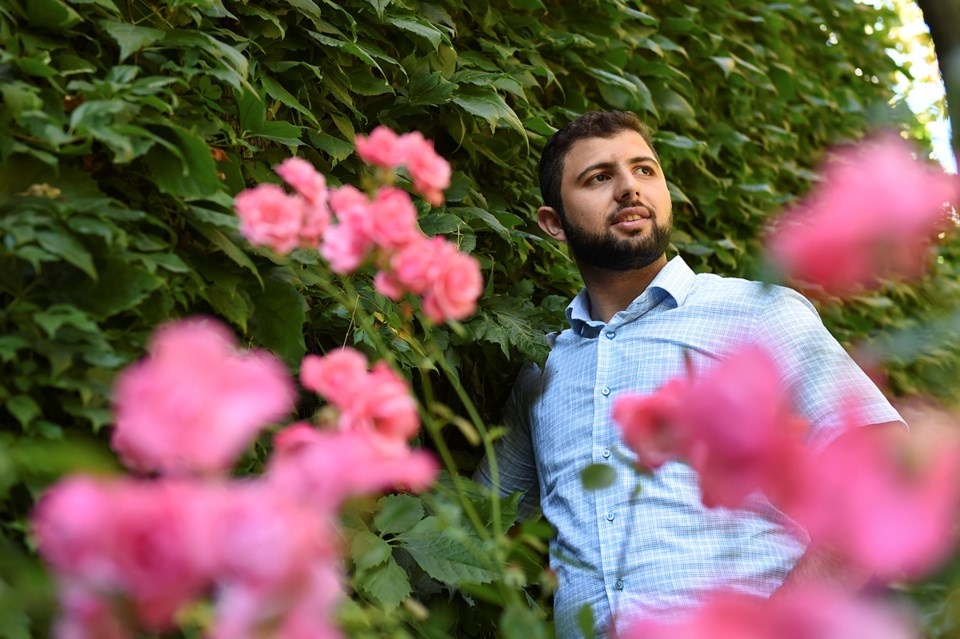Shia Muslims are preparing to celebrate the most important holiday in their calendar next week, but it is a holiday that goes unmarked by their Sunni coreligionists. In fact, Eid Al-Ghadir represents the precise moment when Islam split into two main factions.
The occasion commemorates what Shias believe was the anointing of Ali ibn Abi Talib, commonly called Imam Ali, by the Prophet Muhammad as his divinely chosen successor. They will celebrate in their homes and at a major public event, fasting, praying, giving gifts and feasting.
Mohamad Assad and Ali Al-Samak are members of the youth organization associated with the Al Mustafa Academy, a Shia educational institution in Surrey. They are among the organizers of the region’s main public celebration of Eid Al-Ghadir, Sept. 25 at the Michael J. Fox Theatre in Burnaby.
“This is our biggest event of the year for our community in Vancouver,” says Assad, who expects about 600 people at the event, which takes place in English and to which everyone is welcome.
“At the celebration, we have different types of programming,” he says. The keynote of the event is a lecture, this year by Hajj Hassanain RajabAli, a noted American speaker on Islam, who will place the historical events in context. “As well, we have poems recited by the youth, skits organized by the youth and performed by the youth, we have videos produced by the youth as well, things like that.”
Eid Al-Ghadir falls shortly after the hajj, the pilgrimage to Mecca, because it was just after Muhammad’s final pilgrimage that he stopped his caravan and gave the sermon that would cause a millennium and a half of division. Both branches of Islam accept the version that says Muhammad addressed his followers at Ghadir Khumm, but the interpretations of what he is believed to have said split the Ummah, the Muslim community.
Shias contend that Muhammad’s words cited Ali as his divinely chosen successor. Sunnis believe that the succession was to be determined by the consensus of the followers.
“That’s where we differ,” Assad says. “The leadership after the holy prophet. Imam Ali was chosen, we believe was chosen by God, to be announced to the people that after the holy prophet. Our Sunni brethren believe that it should be voted by people after the holy prophet.”
For their part, Sunnis recognize Ali as a righteous leader, but diverge from Shias in seeing him as Muhammad’s divinely appointed successor. At the time of Muhammad’s death, in 632, a group centred around Abu Bakr, Muhammad’s father-in-law, who became caliph, the leader of the followers of Muhammad. Shias go back to the words of the prophet at Ghadir Khumm.
“The only point of difference is the significance of what the prophet’s message was,” says Al-Samak. “We believe that this was the coronation [of Ali].”
“For us, it’s kind of ideological,” he continues. “We never chose the prophet. God chose the prophet. For us, it makes sense that God would not just leave it up to an election, because people could make a mistake. They could elect the wrong person. We don’t believe that. God has chosen all the other prophets, like Jesus, like Moses, like the prophet Mohammed, he would also choose the successor to our prophet.”
While Shias are a small minority of Muslims in the world, they are spread across many countries. This means that the ways the holiday is marked, such as the foods in the feast, differ greatly. Still, says Al-Samak, Eid Al-Ghadir is a time of unity for Shias.
“From our disparate, various backgrounds as a Shia community, it brings us all together as one people who believe in this,” Assad adds. “Celebrating this together really means a lot personally to me. Events organized by our youth are overwhelmingly joyful to see. As well, this is a very auspicious occasion where we believe our faith has been completed, from believing in the leadership of Imam Ali and his leadership, of the continuous progeny through him, we believe from his progeny will come Mahdi [the prophesied redeemer said to return before the Day of Resurrection], which will bring in peace and joyous tidings to the earth after many problems and injustices going on in the world.”
Sunnis are by far the majority among Muslims, estimated at as much as 90 per cent of the global Muslim population. Sunnis make up the majority of most Muslim countries, while Shias comprise majorities only in Iran, Iraq, Azerbaijan and Bahrain, with sizeable Shiite minorities in Saudi Arabia, Pakistan, Lebanon, Syria, Turkey and Yemen.
While Shias are small in number, Al-Samak says the moral model of Imam Ali unsettles political elites.
“A lot of people, the dictators especially in the Middle East, they see Shia ideology as kind of a threat because this man ruled [in a way] that would make any ruler today be ashamed of himself,” he says.
This sense of morality is a core belief, Al-Samak says, expressed by Muhammad and infusing Islamic thought, both Shia and Sunni.
“Your fellow brothers are your brothers in faith or your brothers in humanity,” he says. “So whether we share the same faith or not, at the end of the day, we are all humans, we are all trying to reach perfection and we need to respect each other and our beliefs as a society.”
@Pat604Johnson
Note: This story has been corrected since first posted.



